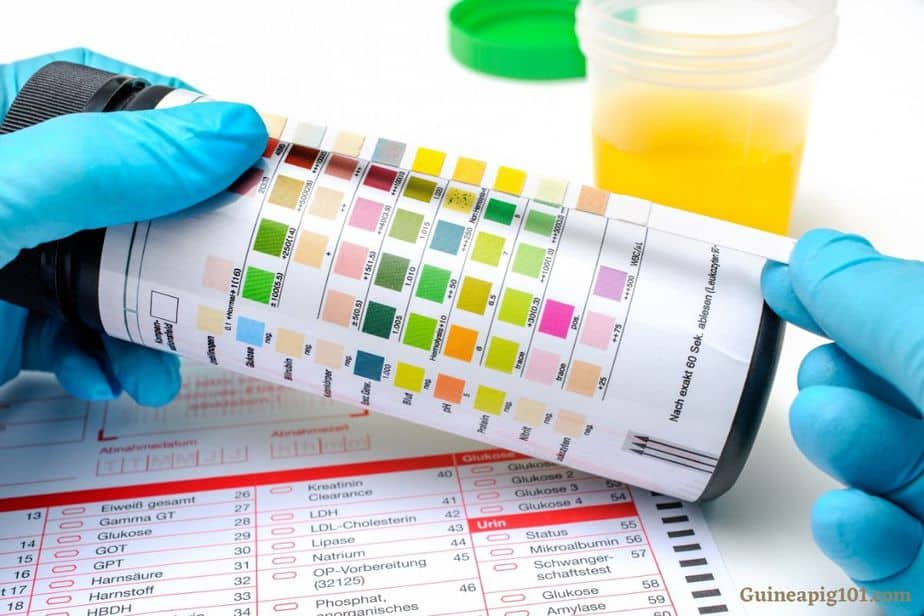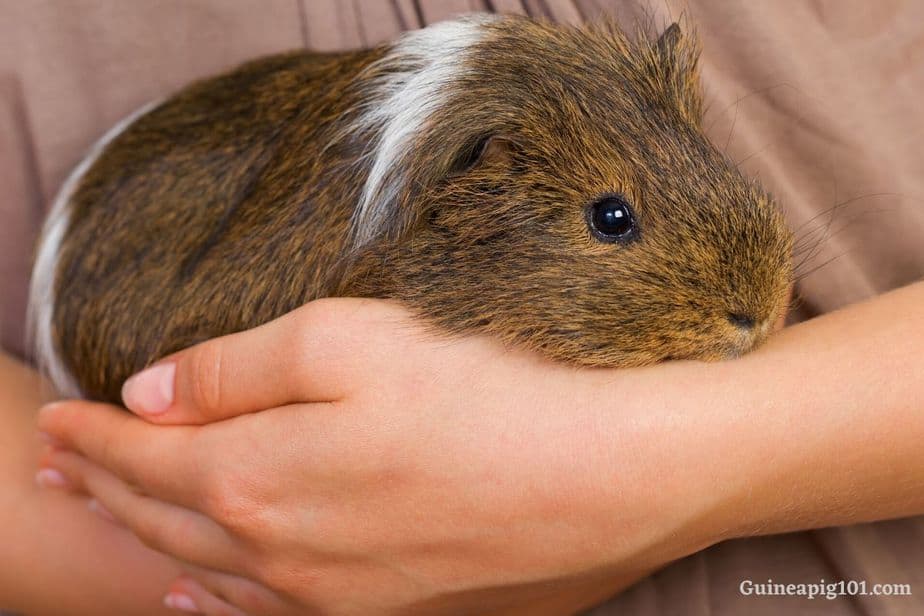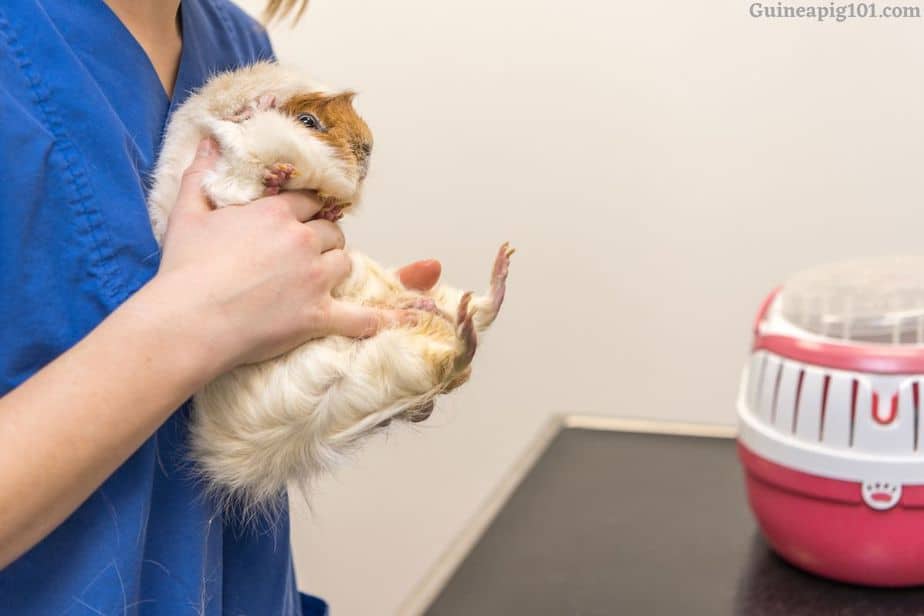Many guinea pig owners freak out when they find red urine in guinea pigs cage while cleaning it out. But what does the red color in urine indicate? Is it really blood traces? Should you be worried? I did some research, and here is what I have learned.
If your guinea pig has a bright red color or orange color pee, then it’s likely a pigment from the food. The color will change again within 24 hours if you don’t feed the same food back. However, if you doubt there is blood in your guinea pig’s urine, you can check the same using a dipstick.
If you have fed food like beets, watermelon, strawberries, Red Grapes, etc. then the red color is likely due to pigment present in these vegetables and fruits.
Lycopene and Anthocyanin are the two compounds that give this food their bright red color. So, there is a high chance that the red color pee in your guinea pigs is due to this food.
However, if you see a fleck of blood in clear urine, then there is a high probability of blood in the urine.
These could be the signs of some health issues, including Bladder stones and Urinary Tract Infection.
In such a scenario, regular treatment with antibiotics prescribed by your vet could fix the problem in no time.
Why is my guinea pigs pee red?
I know it can be concerning for some guinea pig owners when they see the red urine for the first time.
The first thought that may come to your mind will be, is my guinea pig bleeding?
However, reality can be a lot different. Red pee is more common in guinea pigs than you might think.
The food pigment has likely dyed the color of your guinea pig’s urine.
The food that you may have fed in the last 24 hours could be the cause of change in the shade of urine in your guinea pigs.
While healthy urine is yellowish in color, some guinea pigs may have orange, pinkish, and red color urine.
When you first notice some red color pee in your guinea pig’s cage or bedding, you must not react immediately.
A wait-and-see approach could be your best bet. Wait for at least 24 hours and check for the urine color, you will likely find the color is back to normal.
If so, you need not worry about your guinea pig’s well being. If your guinea pig has red or darker color urine for two to three straight days, you should still wait and see if something in their diet is leading to the change in color.
Sometimes stress and dehydration in guinea pigs are also one of the significant factors affecting the color of their urine.
If you suspect there is a possibility that your guinea pig is bleeding, you can get a dipstick and check for the same.
What foods cause guinea pigs urine to turn red?

Foods that are red in color often leads to red urine in guinea pigs.
These foods are rich in Lycopene and Anthocyanin that gives them a bright red color.
However, some other plants can also cause red urine in guinea pigs.
Some of the common plants that cause guinea pigs urine to turn red are:
- Beetroots and its leaves
- Red cabbage or Red Leaf Lettuce
- Red Bell pepper
- Watermelon
- Strawberries, Red Grapes, Cranberries & Raspberries
- Carrot
- Spinach(rarely), etc.
If the red urine is caused by any of these plants, then the dye may not last for more than 1-2 days.
However, if you continue feeding them the same plants, then it may last longer.
Some antibiotics can also lead to red urine in guinea pigs due to chemical compounds present in those medicines.
So, if your guinea pig is under medication prescribed by a vet, you can consult them for more info.
How to test blood in a guinea pig’s urine?

The presence of blood in the urine can be concerning for owners.
If, after the preliminary examination, you still suspect that there are traces of blood in the urine, then you must go for a test to get a conclusive result.
There are two ways to test blood in a guinea pig’s urine. These include:
- Visiting a vet: A vet can test blood in your guinea pig’s urine, but it is going to take some time and cost you as well. If you have no idea how to do it on your own, then go for a vet. You can find out a nearby vet clinic from our exhaustive Vet List.
- Use a dipstick: A dipstick is a simple test kit that can be used to find traces of blood in the urine. Simply apply the dipstick to the urine sample, the color of the strip will change. Match the color with the reference chart, and you will have your answer.
My guinea pig is peeing blood
Guinea pigs that have been diagnosed with blood in their urine are referred to as a condition called ‘Hematuria.’
This is not a disease but a symptom of some other health problem in your guinea pigs.
If there are urine traces detected in your guinea pig’s pee, then you must take professional help.
Never try to treat your guinea pigs at home. There can be a wide range of health issues leading to blood in your guinea pig’s pee.
It can be anything from a small infection to a significant health issue that can be life-threatening for your guinea pigs.
In such circumstances, reaching out to a professional vet and getting the treatment done is the best solution.
Some of the common health problems that causes blood in guinea pig’s urine include:
- Pregnancy: Many guinea pig owners often see some blood discharge from the vaginal area of their guinea pigs. Although the discharge may not be a significant one, but it is a possibility. This could happen either just before the birth or due to some complications as well.
- Bladder stones: Guinea pig suffering from bladder stones(Urolithiasis) can see some blood discharge along with the urine. It also makes the urination extremely painful for them.
- Kidney stones: Kidney stones can also be a significant cause of blood in the urine. The stones are formed in the kidney and are extremely painful for our guinea pigs.
- Urinary tract infection: UTI is yet another common cause of blood in your guinea pig’s urine. Middle age guinea pigs are more prone to UTI’s than others. It can be a painful condition for your guinea pigs. However, it can still be treated with proper medication.
- Trauma: If your guinea pig had some sort of injury or accident, then they might be bleeding internally. A fall from a height, a significant fight among guinea pigs, etc. could be the reason.
- Cystitis: It is a bladder infection in guinea pigs caused by inflammation in the urinary tract. It can also lead to blood in the urine of our guinea pigs.
- Tumor: Tumor around the genital area can also be one of the common causes of blood in your guinea pig’s urine. Although most of the tumor is benign, but some of them can lead to serious health issues, including cancer.
What do I do if my guinea pig is peeing blood?

As we had discussed earlier, the blood in the urine is likely a symptom of some disease and not the disease itself.
Thus, the treatment of guinea pig that has blood traces in their urine shall depend upon the correct diagnosis of the disease.
It is recommended to visit a professional Vet for proper diagnosis as a situation might get worse if we make a mistake during diagnosis.
Once the vet has diagnosed your guinea pig properly, they will provide you with a treatment plan.
While some mild health problems can be treated with medication and change in diet, other severe ones might require emergency surgery.
Internal Bleeding:
If your guinea pigs have suffered from any physical injury, then the vet might need to do somebody scans to find internal injuries.
Guinea pigs will likely hide the injury for as long as possible, which can make the situation worse.
If it is a mild injury, then your guinea pigs might recover on their own.
However, for severe injuries, appropriate surgery or treatment may be needed.
Always err on the side of caution and try to avoid any significant physical harm to your guinea pigs.
Kidney or Bladder Stones:
If your guinea pig has a kidney or bladder stone, then there are only two ways to get rid of the same.
If the stone is small, then encouraging water intake and cutting down on high calcium food can do the trick. This will ensure the stones get dissolved and move out.
You can encourage your guinea pigs to drink more water by encouraging some exercise.
Adding some treats in the nozzle of the water bottle can also attract them towards it.
However, if the stones are more substantial than it can be challenging to dissolve the same by dietary changes.
Under such circumstances, we need to go for a surgical procedure from a professional vet followed by the diet change.
Urinary Tract Infection:

Urinary tract infection and Cystitis both require a course of antibiotics for effective treatment.
There is nothing you can do to treat it quickly. Follow the instruction of your vet and ensure a healthy living environment for your guinea pigs.
One of the major causes of these diseases is an untidy living environment.
If the enclosure of your guinea pigs is not cleaned regularly or poor quality bedding material is used, then it becomes a house for bacterias that can lead to such diseases.
Some guinea pigs often complaints that even after treating their guinea pigs for these diseases with antibiotics, the color of the urine is still red.
Please remember that some biotics also changes the color of your guinea pig’s urine.
Thus, continue the course of medicine and inspect the urine at least two days after the completion of the medicine course. You must see a difference then.
Tumors:
Tumors are generally caused by an abnormal multiplication of body cells, resulting in the formation of a lump of tissues.
They can be either malignant( spreading quickly) or benign(harmless).
These cells often end up irritating other organs nearby while they are growing and thus leads to bleeding.
If the tumor is a benign one, then it can be left untreated, but if the vet finds that it is disturbing other organs and leading to bleeding, then they may decide to go for surgical removal of the same.
Are female guinea pigs more likely to pee blood?
Yes, female guinea pigs are more likely to pee blood than male guinea pigs. It is because many health concerns with these symptoms are related to reproductive organs.
Some guinea pig owners often think that their guinea pigs might be menstruating, but that is far from reality. Guinea pigs don’t menstruate. We have a detailed blog post on the same, which you should definitely check out.
In either case, if your guinea pig is urinating blood, then it is more likely to be an emergency.
It could be some health issue, or they have experienced trauma leading to bleeding.
Getting a female spayed or male neutered reduces the chances of most of these health issues.
A spayed guinea pig is more likely to get along with other guinea pigs as they stay calm and affectionate.
In any case, remember the golden rule. If your guinea pig is peeing bright red color urine, it is more like a plant pigment. However, if it is clear urine with some flecks of blood, then it is more like a blood trace.
Source: MSD VET MANUAL, Sawneeanimalclinic, Urine sampling, ureteral obstruction in a pet guinea pig, Composition and characteristics of urinary calculi from guinea pigs, Development of the urinary system in guinea pig females, Cystitis, urolithiasis and cystic calculi in aging guinea pigs, STEROID DIABETES IN GUINEA PIGS
